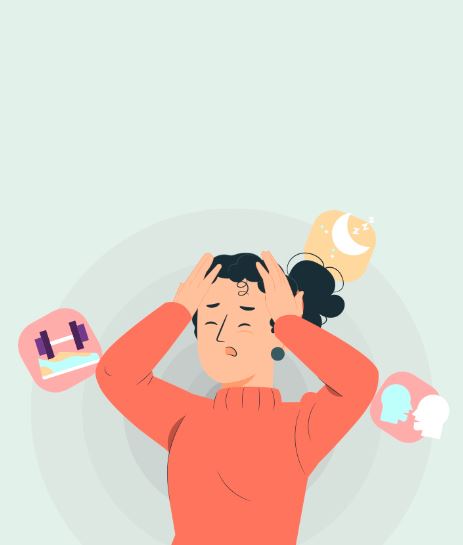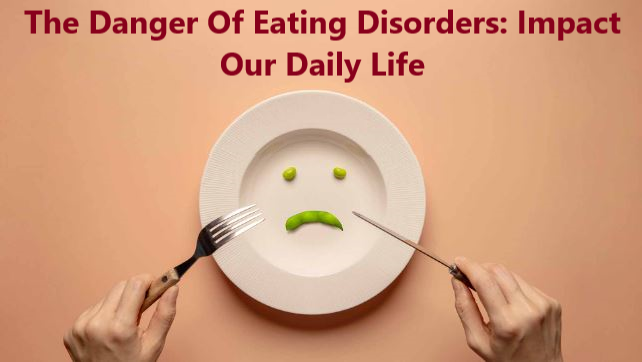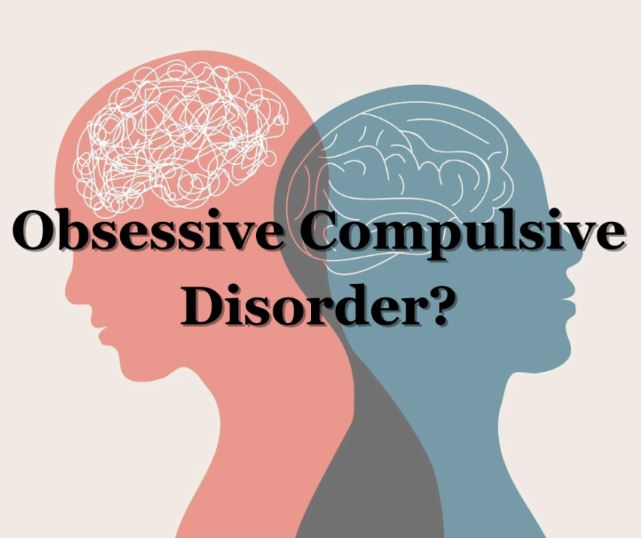
Psychological disorders, also known as mental disorders, encompass a wide range of mental health conditions that affect mood, thinking, and behavior. The understanding and classification of these disorders have evolved over time, leading to a broad categorization in diagnostic manuals such as the Diagnostic and Statistical Manual of Mental Disorders (DSM-5) by the American Psychiatric Association and the International Classification of Diseases (ICD) by the World Health Organization. Here’s an overview of several major types of psychological disorders and their common symptoms:
Table of Contents
1. Anxiety Psychological Disorders
Anxiety Psychological disorders are characterized by excessive fear and anxiety that are difficult to control and cause significant distress or impairment in daily functioning. Common types include:
- Generalized Anxiety Disorder (GAD): Persistent and excessive worry about various activities or events.
- Panic Disorder: Recurrent panic attacks featuring sudden periods of intense fear or discomfort.
- Phobias: Irrational fear and avoidance of specific objects, activities, or situations, such as agoraphobia or social anxiety disorder (social phobia).
Symptoms of Anxiety Psychological Disorders
The symptoms of anxiety Psychological disorders can vary widely depending on the specific disorder but generally include psychological and physical manifestations. Common symptoms include:
- Restlessness or feeling wound-up or on edge.
- Increased heart rate, which can make you feel like your heart is racing or pounding.
- Trembling or shaking, often as a physical manifestation of nervousness or fear.
- Sweating, not related to physical exertion or high temperatures.
- Fatigue, as constant anxiety can be extremely draining and lead to a significant reduction in energy levels.
- Difficulty concentrating or mind going blank, as worry and fear can dominate thoughts, making it hard to focus or think clearly.

2. Mood Psychological Disorders
Mood Psychological disorders involve persistent feelings of sadness or periods of feeling overly happy, or fluctuations from extreme happiness to extreme sadness. Major types include:
Major Depressive Disorder:
Major depressive Psychological disorders are characterized by persistent and intense feelings of sadness for extended periods.

- Feelings of worthlessness or excessive guilt.
- Difficulty thinking, concentrating, or making decisions.
- Recurrent thoughts of death or suicide, or suicide attempt.
Symptoms of Major Depressive Disorder include:
- Persistent sadness or low mood almost every day.
- Loss of interest or pleasure in almost all activities.
- Significant weight loss or gain, or decrease or increase in appetite.
- Insomnia or hypersomnia: Difficulty sleeping or sleeping too much.
- Psychomotor agitation or retardation: Feeling restless or physically slowed down.
- Fatigue or loss of energy nearly every day.
Bipolar Disorder:
Bipolar Psychological Disorders involve episodes of mood swings ranging from depressive lows to manic highs.
Symptoms during a manic phase may include:
- Elevated or irritable mood for at least one week.
- Inflated self-esteem or grandiosity.
- Decreased need for sleep (e.g., feeling rested after only 3 hours of sleep).
- More talkative than usual or feeling pressure to keep talking.
- Flight of ideas or subjective experience that thoughts are racing.
- Distractibility, attention easily diverted to irrelevant or unimportant stimuli.
- Increase in goal-directed activity (either socially, at work or school, or sexually) or physical restlessness.

- Engaging in activities that hold the potential for painful consequences (e.g., unrestrained buying sprees, sexual indiscretions, foolish business investments).
3. Psychotic Psychological Disorders
Psychotic Psychological disorders involve distorted awareness and thinking. The most notable example is schizophrenia.
- Schizophrenia: Characterized by delusions, hallucinations, disorganized speech, and significant impairment in daily functioning.
Symptoms: Symptoms of Schizophrenia include:
- Hallucinations: These involve sensing things that are not present in the environment. The most common hallucinations in schizophrenia are auditory, such as hearing voices that might comment on the person’s behavior, command them to do things, or talk to each other.
- Delusions: These are false beliefs that are not based in reality and are held despite evidence to the contrary. Common delusions in schizophrenia include paranoid delusions (believing that others are plotting harm against them) or grandiose delusions (believing that one has exceptional abilities, wealth, or importance).

- Disorganized Speech: This refers to speech that is difficult to follow, either because answers are not clearly related to questions, sentences are incomplete, or the topic changes erratically.
- Disorganized or Catatonic Behavior: This can manifest as behavior that is bizarre or lacks purpose, difficulties with routine activities, a decrease in responsiveness to the environment, or catatonia, which includes a lack of movement, resistance to movement, or bizarre movements.
- Negative Symptoms: These include a reduction or loss of the ability to initiate and sustain planned activities, speak, express emotion, or find pleasure in everyday life. Common negative symptoms are emotional flatness, lack of motivation, and withdrawal from social interaction.
- Impaired Cognitive Functions: Difficulties with attention, memory, and executive functions, such as planning and decision-making, are common. These cognitive impairments can contribute to challenges in education and employment.
The exact causes of schizophrenia are not fully understood, but a combination of genetics, brain chemistry, environmental factors, and psychosocial factors are believed to play a role. The onset of symptoms typically occurs in late adolescence or early adulthood.
4. Obsessive-Compulsive and Related Psychological Disorders
These disorders involve obsessions (persistent, unwanted thoughts) and compulsions (repetitive, ritualistic behaviors).
- Obsessive-Compulsive Disorder (OCD): The presence of persistent thoughts (obsessions) and behaviors (compulsions) that they feel they must perform.
- Disorganized Speech: This refers to speech that is difficult to follow, either because answers are not clearly related to questions, sentences are incomplete, or the topic changes erratically.
- Disorganized or Catatonic Behavior: This can manifest as behavior that is bizarre or lacks purpose, difficulties with routine activities, a decrease in responsiveness to the environment, or catatonia, which includes a lack of movement, resistance to movement, or bizarre movements.

- Negative Symptoms: These include a reduction or loss of the ability to initiate and sustain planned activities, speak, express emotion, or find pleasure in everyday life. Common negative symptoms are emotional flatness, lack of motivation, and withdrawal from social interaction.
Symptoms of OCD include:
- Excessive cleaning or hand washing
- Repeated checking of things, such as locks or stoves
- Compulsive counting
- Orderliness
- Following a strict routine
- Demanding reassurances
- Avoidance of situations that trigger obsessions
- Hoarding Disorder: Difficulty parting with possessions, regardless of their actual value.
Symptoms of Hoarding Disorder include:
- Persistent accumulation of items, regardless of value
- Difficulty organizing possessions
- Distress at the thought of getting rid of items
- Accumulation of items that clutter living spaces and compromise their use
- Hoarding that causes distress or impairment in social, occupational, or other important areas of functioning
5. Trauma and Stressor-Related Psychological Disorders
These are related to the exposure to a traumatic or stressful event.
- Post-Traumatic Stress Disorder (PTSD): After experiencing or witnessing a traumatic event, symptoms include flashbacks, nightmares, and severe anxiety.
Symptoms of PTSD include:
- Re-experiencing the Trauma: This can occur through intrusive and distressing memories of the event, flashbacks (feeling as though the event is happening again), or nightmares.
- Avoidance: Individuals may avoid places, people, and activities that remind them of the trauma, or try to avoid thinking or talking about the event.
- Negative Changes in Thinking and Mood: This can include negative beliefs about oneself or others, persistent feelings of fear, guilt, or shame, and diminished interest in previously enjoyed activities.

- Alterations in Arousal and Reactivity: Symptoms may include being easily startled, feeling tense or “on edge,” difficulty sleeping, and angry outbursts.
- Adjustment Disorders: Emotional or behavioral symptoms in response to a specific stressor.
Symptoms of Adjustment Disorders include:
- Marked Distress: This is in excess of what would normally be expected from exposure to the stressor.
- Significant Impairment: The stress and symptoms experienced significantly impair social, occupational, or other important areas of functioning.
- Behavioral and emotional symptoms may include feeling sad, hopeless, or withdrawn, experiencing frequent tears, anxiety, worry, or feeling overwhelmed by circumstances.
6. Eating Psychological Disorders
Eating disorders are characterized by abnormal or disturbed eating habits.
- Anorexia Nervosa: An obsession with food and being thin, leading to severe weight loss.
Symptoms of Anorexia Nervosa include:
- Intense fear of gaining weight or becoming fat, even though underweight.
- Restriction of food intake leading to significantly low body weight.
- Distorted perception of body weight or shape, undue influence of body weight or shape on self-esteem, or denial of the severity of low body weight.
- Severe dietary restrictions, fasting, or excessive exercise.
- Absence of menstruation in females.
- Bulimia Nervosa: Binge eating followed by purging to avoid weight gain.

Symptoms of Bulimia Nervosa include:
- Recurrent episodes of binge eating, characterized by eating an excessive amount of food within a discrete period of time and a sense of lack of control over eating during the episode.
- Recurrent inappropriate compensatory behavior in order to prevent weight gain, such as self-induced vomiting, misuse of laxatives, diuretics, or other medications; fasting; or excessive exercise.
- Self-esteem overly influenced by body shape and weight.
- The binge eating and inappropriate compensatory behaviors both occur, on average, at least once a week for three months.
7. Personality Psychological Disorders
Personality Psychological disorders are characterized by enduring maladaptive patterns of behavior, cognition, and inner experience.
- Borderline Personality Disorder (BPD): Patterns of instability in personal relationships, self-image, and emotions.
Symptoms of BPD include:
- Intense, unstable relationships: Alternating between extremes of idealization and devaluation (sometimes referred to as “splitting”).
- Impulsive and risky behaviors: Such as reckless driving, substance abuse, binge eating, or risky sexual behavior.
- Unstable self-image or sense of self: Individuals may have a significantly distorted self-image and feelings of insecurity and low self-worth.
- Emotional instability: Frequent emotional swings and intense emotions that can last from a few hours to several days.
- Chronic feelings of emptiness.
- Explosive anger: Difficulty controlling anger or frequent displays of temper.
- Fear of abandonment: Efforts to avoid real or imagined abandonment by friends or family.
- Self-harming behavior: Such as cutting, or threats or attempts of suicide.
- Antisocial Personality Disorder: A lack of regard for the moral or legal standards in the local culture.

Symptoms of Antisocial Personality Disorder include:
- Disregard for societal norms or laws: Repeatedly performing acts that are grounds for arrest.
- Deceitfulness: Repeated lying, use of aliases, or conning others for personal profit or pleasure.
- Impulsivity or failure to plan ahead.
- Irritability and aggressiveness: Repeated physical fights or assaults.
- Reckless disregard for the safety of self or others.
- Consistent irresponsibility: Repeated failure to sustain consistent work behavior or honor financial obligations.
- Lack of remorse: Being indifferent to or rationalizing having hurt, mistreated, or stolen from another person.
Conclusion
Psychological disorders can significantly impact an individual’s quality of life, but with appropriate diagnosis and treatment, many people with these conditions can lead healthy, productive lives. If you or someone you know is experiencing symptoms of a psychological disorder, it’s important to seek professional help. Mental health professionals can provide diagnoses and recommend treatments such as psychotherapy, medications, or a combination of both to manage symptoms effectively.










